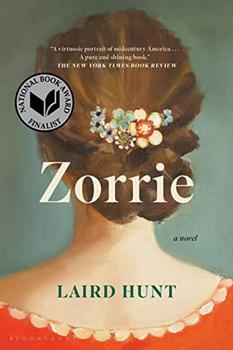Summary | Excerpt | Reading Guide | Reviews | Beyond the Book | Readalikes | Genres & Themes | Author Bio

When it rained, Zorrie sat at her desk and, brow furrowed, labored over her slate while the other children played checkers and spun tops and jumped around the room. She liked the musty smell of the books and the feel of chalk residue on her fingers and couldn't be convinced that the inside of the schoolhouse was meant for anything but learning. She loved the songs Mr. Thomas taught them and the stories he told about battles fought long ago. She didn't learn to read as quickly as some of the others, but when she did, she rarely made a mistake. From the start, her mind moved quickly through figures and made light work of anything to do with geography. In fact, she knew the capitals of the forty-eight states and the names of all the South American countries before several of the older children and, after whispering the names of the major European cities to herself over and over again before she fell asleep each night, received the highest marks of the school on a year-end geography exam.
If Zorrie was at home, which is where she was to be found on school days after her fifteenth birthday, she helped with the goat or the garden or the chickens or the cooking or the sewing her aunt took in. Though her ruined marriage had left her at best ambivalent about the faith of her former husband, her aunt never set aside a Lutheran's belief in the redemptive power of work, and something like a gleam, a little bit of breath on a little bit of near-burned-out coal, would enter the old woman's eye whenever Zorrie would finish a job quickly and start another one. At moments like those, her habitually pinched lips might part and a few words emerge. Sometimes it was about a plan she had once had to open a flower shop in nearby Frankfort, a nice place with peonies or lilies in the window and a chair or two on which her tired customers might sit a moment on a hot day. She would talk too about a trip she had taken before her marriage, to Bedford, where she had spent hours in a fabric store running her hands over bolt after bolt of crinoline and serge and silk. Every once in a great while her aunt would sing softly in a voice that was thin but true, songs that tended in the main toward melancholy, like the one about a man who each day put on his suit, cut a single flower from his garden, and carried it five miles along a dusty railroad track to the house of the woman he loved. Sometimes in the song he did this until the woman agreed to marry him, and others he did it until one or the other of them had died.
As their shovels scraped or their needles flew, her aunt might, on exceptionally rare occasions, offer some comment about Zorrie's parents. A blue dragonfly had once landed on her mother's finger at a church supper and made her shriek. She had loved blackberries and angel food cake and had had an uncommonly loud laugh. Her father had been good at horseshoes, bad at plowing, and given more easily than was seemly to tears. Zorrie worked, on those days when her aunt's lips parted and she spoke or sang, until her fingers ached and her eyes blurred in hopes that it might continue. She worked until it felt like there was a knife blade jabbing at the muscles around her neck. She worked until she had started making mistakes and then stopped, took a deep breath, and picked up where she had left off. Once, on one of those long days, when she had finished hemming a skirt and had reached for another, her aunt called her a good girl. Zorrie waited for years but never heard it again.
Excerpted from Zorrie by Tristram Hunt. Copyright © 2021 by Tristram Hunt. Excerpted by permission of Bloomsbury USA. All rights reserved. No part of this excerpt may be reproduced or reprinted without permission in writing from the publisher.
Discovery consists of seeing what everybody has seen and thinking what nobody has thought.
Click Here to find out who said this, as well as discovering other famous literary quotes!
Your guide toexceptional books
BookBrowse seeks out and recommends the best in contemporary fiction and nonfiction—books that not only engage and entertain but also deepen our understanding of ourselves and the world around us.